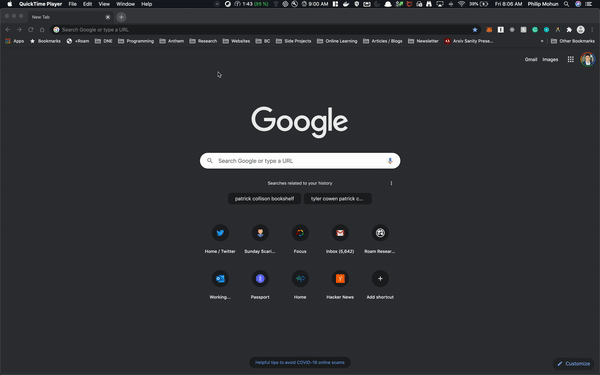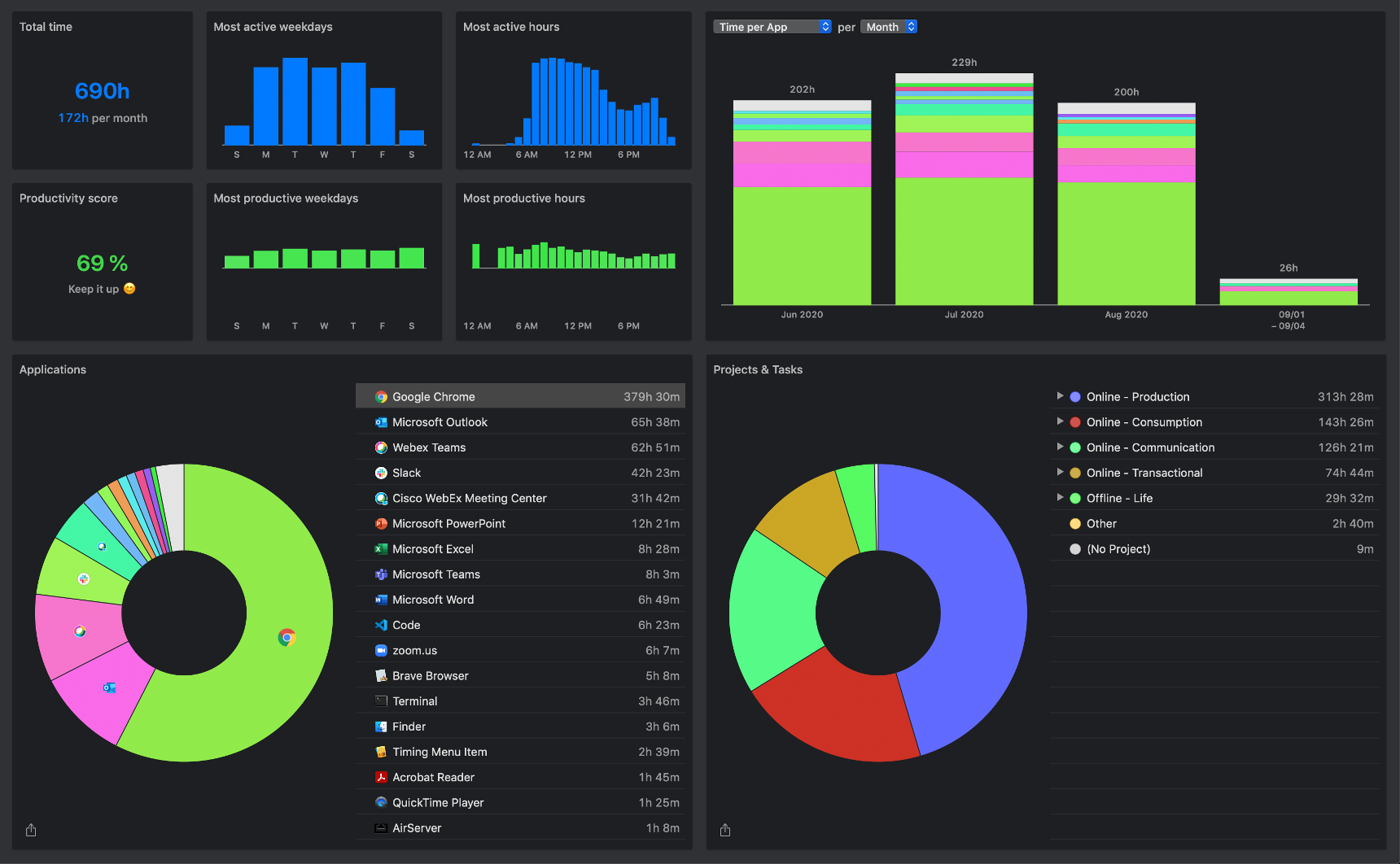Personal Productivity
A third of Americans are online almost constantly, yet so much of that time feels wasted. The line between work and entertainment has blurred. Our days have become murky — after ten hours spent staring at a screen, everything tends to blend.
We live in an information economy. This means that we live healthier and wealthier lives because technological progress has made it easier to share knowledge. In this type of economy, the scarce resource isn’t mechanical labor or raw materials: it’s attention.
When attention is scarce, time online is not spent equally. My personal internet usage can be (roughly) broken down into the following categories:
Passive: browsing, reading, short-form content
- Consumption: social media, news sites, and other unstructured research and learning (e.g., Wikipedia)
- Transactional: financial websites, shopping, and other administrative activities (e.g., calendars)
Active: writing, programming, talking with others
- Production: writing and creative work, researching specific questions, software-as-a-service tools, and note-taking
- Communication: email, chat clients (e.g., Slack), and forums
The internet is so much more than a way to consume content passively. It gives us a way to provide value to others with the click of a button. It also provides a level of distraction that we’re not equipped to deal with.
As a knowledge worker, my best days happen when I focus exclusively on production before lunch. Transactions and consumption feel good when they’re happening, but this quickly wears off, leaving me drained and dissatisfied. On days when I am distracted, I consume more content, which further reduces my ability to focus. It’s a vicious circle.
Distractions surround us. The most successful knowledge workers are not necessarily smarter; they just know how to focus effectively. But the information economy is still new — unlike previous economic output measures, we can’t measure focus as easily as we can measure units of steel or barrels of oil.
I’ve come up with a system to measure my ability to focus. It’s not perfect, but it helps me to course-correct when I feel myself getting off track. There are two major components: preventing distraction and measuring output.
Preventing distraction
Being a knowledge worker means fighting a constant battle against distraction. The internet is our gateway to work, but it also provides the most alluring entertainment in humanity's history. Both of these exist simultaneously on a 15” screen ten inches from your face for eight hours per day. When the difference between work and entertainment is a button click, we don’t stand a chance.
I’ve accepted this and have decided to fight fire with fire. Software created our problem; maybe it can solve it. The software is called Focus, a taskbar application that blocks a preselected list of distracting websites.
Here is what happens when my bad monkey brain tries to go to Twitter during the workday:

This software adds friction that helps to prevent me from going into a rabbit hole of distraction. Similarly, I use Screen Time on my phone to add time limits for myself. My ideal system would turn my habitual browsing into something more productive.
These preventative measures are not meant to be bulletproof. Sometimes I need to check my personal email in the middle of the day. In these situations, it’s easy to override the blocker that Focus puts into place manually.
Software can only help with preventing distraction if you want it to. It’s meant to be a trigger, not a complete replacement for self-control. The key to focusing online is to snap yourself out of habits formed during non-working hours.
Measuring output
Earlier, I mentioned that we don’t have a way to measure the output from knowledge workers as we do for physical workers (e.g., manufacturers or laborers). Knowledge work does not accrete into a tangible output like a car or a house that we can see as a sign of progress.
We can look at proxies like lines of code written, number of emails sent, or time spent in meetings (please don’t do this), but these don’t tell us about the value of what was produced. This is an important question!
It’s important because we commonly model a country’s economic output using the Solow Growth Model, which measures how quickly we produce new things. This model's entire premise is based on the idea of “increased productivity” as the main driver of long-term growth. Despite how widely accepted this model is, we still don’t know how to measure individual productivity. Knowledge workers make up the fastest-growing portions of our economy, yet we have very few ways to determine who is most contributing to this growth. Tyler Cowen identified this as one of his problems to work on. Here is what he said:
Better answers for how to quantify worker productivity. In most knowledge industries, companies have nothing better than highly subjective measures (i.e., supervisors’ assessments) of worker productivity. In theory, it seems significant improvements should be possible. In the short term, is it possible to measure the productivity or efficacy of individual managers, software engineers, educators, scientists? How about teams, and what size of team? And can we do so without creating Goodhart’s Law problems?
In large organizations, this becomes even more difficult. Without a standardized way to measure output, we rely on top-line metrics like revenue or headcount. Anyone who has worked in a company larger than a few people can tell you how difficult it is to relate individual performance to these metrics. It’s nearly impossible to tell how much a single employee contributes to a company's overall success.
I’ve landed on a way to review how I spend my time retroactively. This is what my personal productivity dashboard for the last few months looks like:

This was created using a software called Timing, which tracks my screen time and app usage. Timing was created for freelance workers who bill their time based on projects. I use it to understand which applications are taking up my attention.
Timing tracks my daily productivity based on my application use. It also tracks screens within each application — this helps to provide more granular data for productive browser-based tools like Jupyter Notebook or Roam.
I usually keep an eye on my productivity score during the workday. If I see it dipping too low, it is a good trigger that I’ve probably been allowing myself to get distracted. This information helps me understand what I’m working on and when I’m working on it.
By combining my personal goals with this dashboard's information, I can understand where I’ve missed the mark. For example, if I intend to spend 2 hours per day writing, this dashboard can keep me honest about how I’m progressing against that goal.
This process continues to evolve, and I’m sure I’ll find improved ways to measure my own output. I’ve written about a few of my other digital hacks in the past, which you can find here:
- Digital Distraction: an analogy to intermittent fasting that helps reduce unnecessary screen time
- Urgently Unimportant: three strategies for prioritizing knowledge work
- Where Does The Time Go: the psychology of multi-tasking
If you enjoyed this issue of Sunday Scaries, please consider sharing it with a friend.
Sunday Scaries is a newsletter that answers simple questions with surprising answers. You can subscribe by clicking the link below. 👇